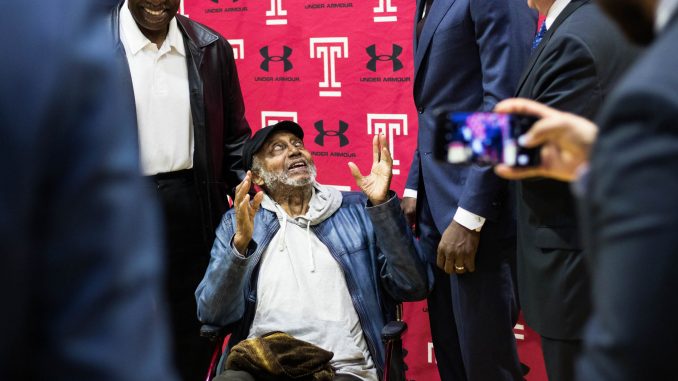
John Chaney’s impact on the Temple University community went far beyond his immense knowledge of the basketball court, said former Temple men’s basketball coach and acting athletic director Fran Dunphy.
For his players, Chaney made them a part of his family and his life.
“He would wrap his arms around you and brought you into his family, made you a part of his world, you can’t replace that,” Dunphy said.
Chaney, a Temple coaching legend who led the men’s basketball team to 17 NCAA tournament appearances in 24 seasons, died of a short illness on Friday morning. He was 89.
Chaney won 516 games with the Owls and 741 games overall. His number of victories ranks 41st in NCAA history among all divisions.
“He was more than just a hall of fame basketball coach,” Dunphy said in a Temple Athletics release. “He was a hall of fame in life, he touched countless lives, including my own.”
Chaney grew up in Philadelphia and attended Benjamin Franklin High School, according to the release. Chaney began his basketball coaching career after graduating from Bethune-Cookman University and playing briefly in the Eastern Basketball League.
He went on to coach at Cheyney State College, now known as Cheyney University, where he won 232 games and the 1978 Division II national title before moving on to Temple, giving him a chance to coach Division I basketball at the age of 50.
He was twice named the national Division I coach of the year, and in 1987-88, he finished the season 32-2, going 18-0 in Atlantic 10 play and ending the season ranked No. 1 in the country, according to the release.
While he was known by his players and the basketball community at large for his strong basketball IQ, he also taught his student-athletes to focus on their education, according to the release.
“John Chaney was a great coach, but he was so much more,” President Richard Englert said in the release. “For generations of Temple University students, he was a wise counselor, a dedicated teacher, an icon of success and a passionate leader who always led by example and with conviction.”
Many of Chaney’s players came from challenging backgrounds or were the first in their families to graduate from college, according to the release. Chaney mentored them while they were students and stayed involved in their lives long after they graduated.
“Coach Chaney was like a father to me,” said men’s basketball head coach Aaron McKie, who played for Chaney from 1991 to 1994 in the release. “He taught not just me, but all of his players more than just how to succeed in basketball. He taught us life lessons to make us better individuals off the court. I owe so much to him. He made me the man I am today.”
Chaney recruited McKie out of Simon Gratz High School to begin as a freshman at Temple during the 1991-92 season. McKie had an incredible three-year career at Temple, ranking sixth in all time points scored and leading the team to an Elite Eight appearance in 1993.
McKie became a coach because he wanted to have the same impact on student-athletes as Chaney had on him, McKie said.
“He inspired me since I was a little kid, he was one of the few Black men I could look at in our society and say I want to be just like him,” he added. “The impact he had on the community and the university, that’s the natural next step, I wanted to move into coaching.”
After retiring as Temple’s head coach in 2006, Chaney remained a staunch supporter of the program and Dunphy’s personal friend, according to the release.
Dunphy and Chaney became friends while Dunphy was head coach at the University of Pennsylvania and Chaney coached at Temple.
“He won many games, but the people he touched, the lives he influenced was vast, and I am totally among them,” Dunphy said.
Chaney was revered by NCAA administrators for his innovation, perseverance and the example he set for others, said Dan Gavitt, the NCAA’s senior vice president of basketball.
“It’s impossible to measure the influence Chaney had on those who played for him, to the city of Philadelphia and to college basketball coaching colleagues from across the country,” Gavitt added.
Chaney viewed coaching at Temple as a passion, not a job, he said during his retirement speech in 2006.
“When I look back, it will not be the wins and losses, but the people who influenced me and touched me greatly, and especially the men’s and women’s coaches and players who have made this university and my time here so special,” Chaney said during the speech.
Chaney was not only a successful coach, but he was a trailblazer for other Black coaches and supported educational opportunities for all students, Gavitt added.
“While we mourn his passing, his strong presence, influence, and passion, delivered in his distinctive voice, endures forever,” Gavitt said.


Be the first to comment